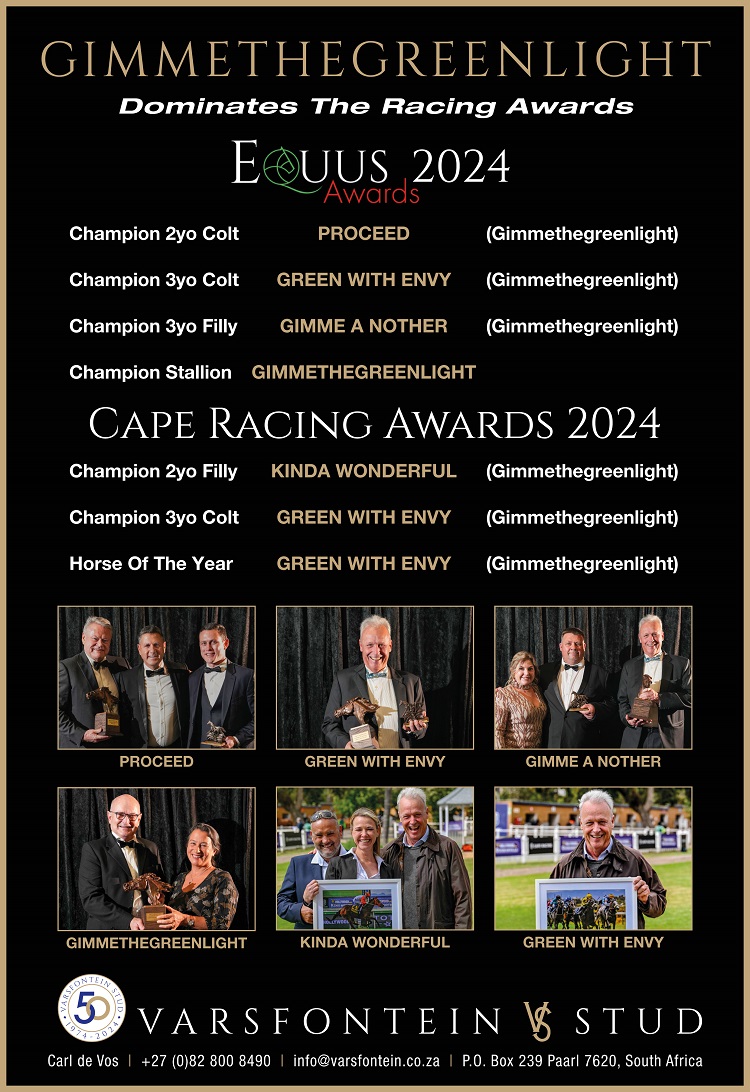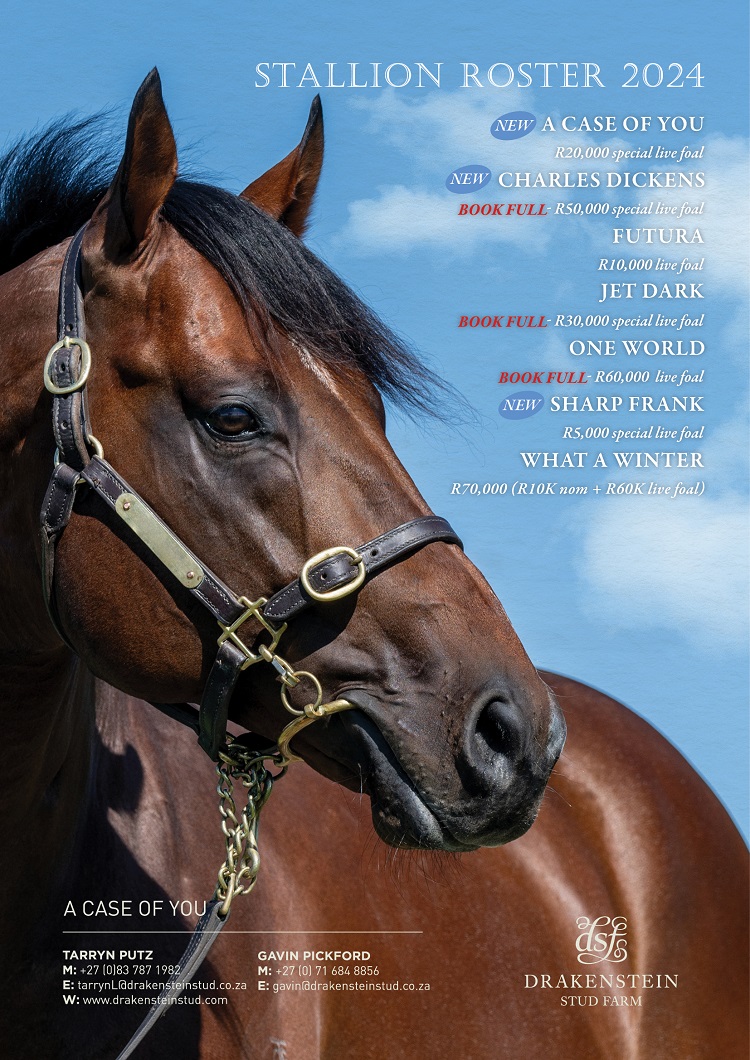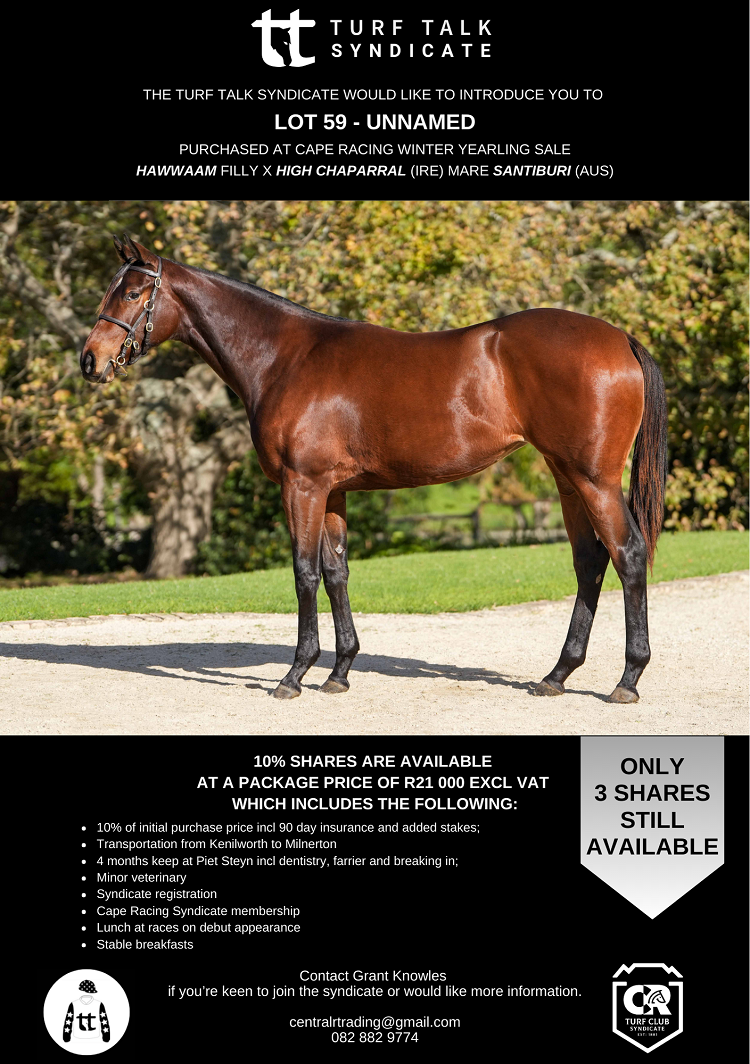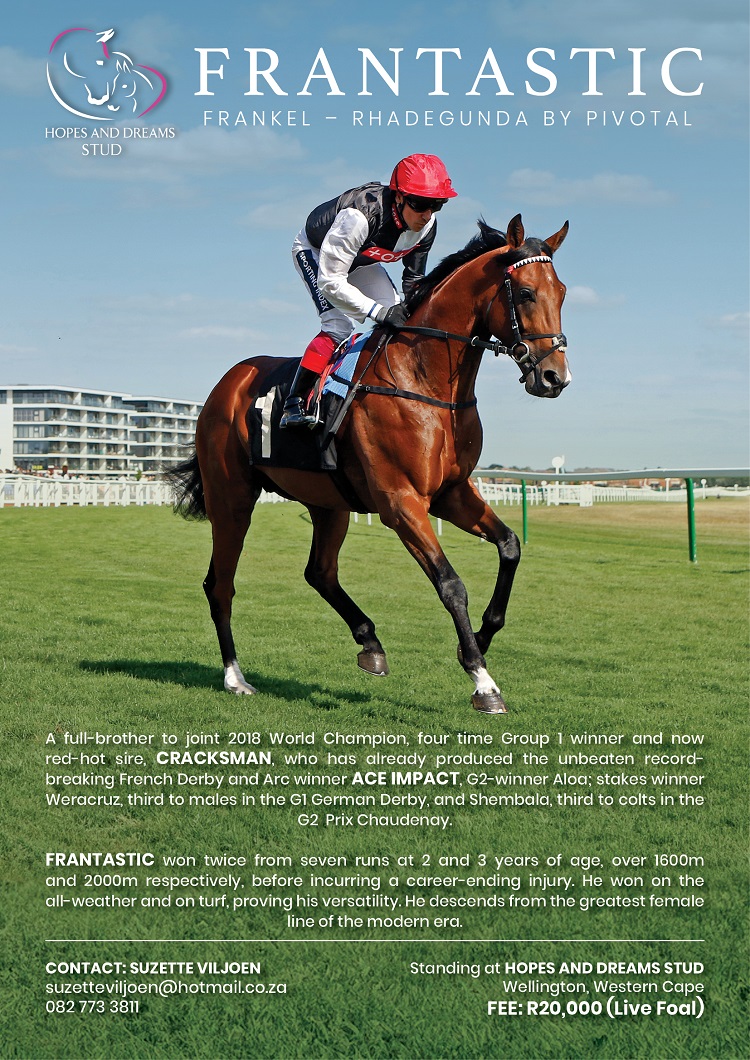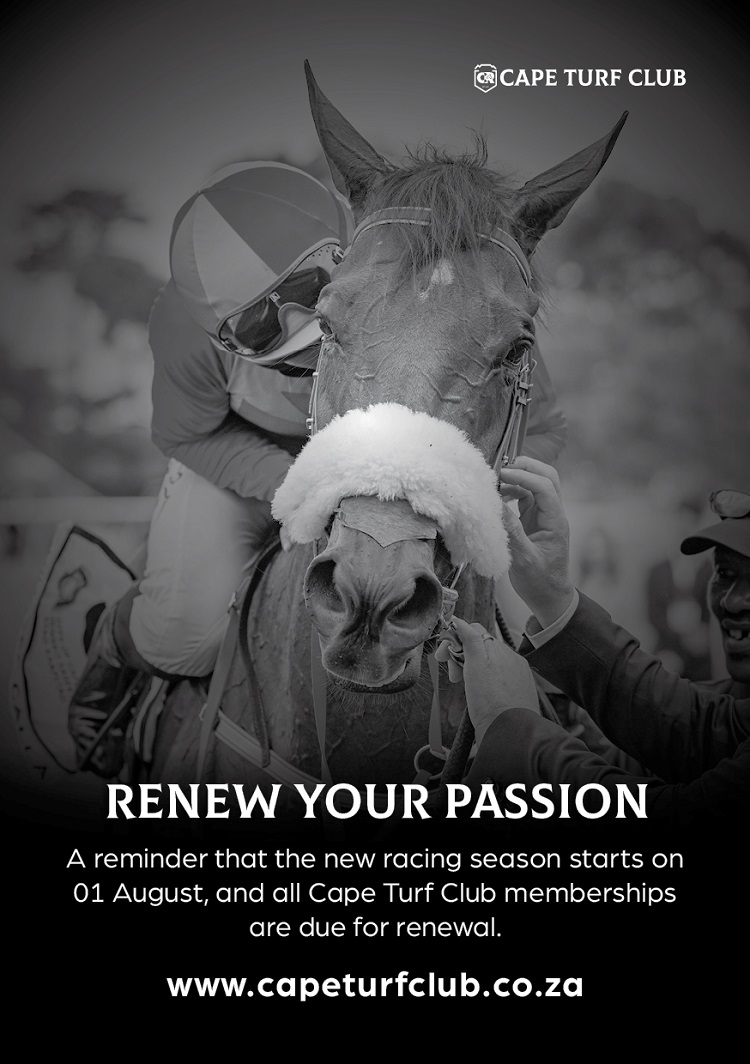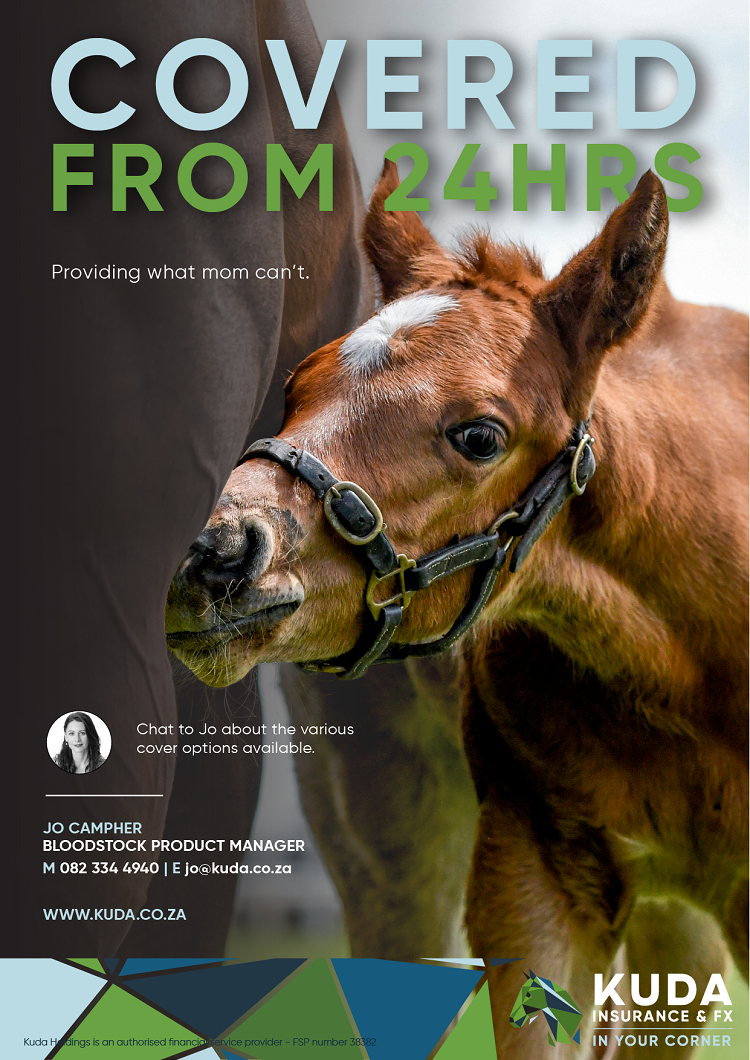
Beach Bomb All Set For Saturday's USA Debut
Picture: Beach Bomb (Image: Wayne Marks)
The former Candice Bass-Robinson-trained Drakenstein Stud-homebred Lancaster Bomber filly Beach Bomb is all set to make her debut at Monmouth Park in New Jersey, USA, on Saturday
Marcus Hersh of the DRF website previewed the race, the Violet Stakes over a mile and 1/16th on turf.
Brown, Motion square off in Violet Stakes
Marcus Hersh (DRF.com Aug 29, 2024)
It’s Brown versus Motion on Saturday in filly-and-mare turf routes in Kentucky and New Jersey.
Mission of Joy and Sparkle Blue for Graham Motion take on Chad Brown-trained Fluffy Socks in the Kentucky Downs Ladies Turf, and in the $100,000 Violet at Monmouth Park, Motion sends out Beach Bomb, while Brown has Maman Joon.
Seven went into the 1 1/16-mile Violet, a patchwork group that on paper should be dominated by the Motion and Brown fillies.
Beach Bomb brings a rare résumé into the Violet, her first start since being exported from her native South Africa, where she won a pair of Group 1 races, including the Cartier Paddock Stakes on Jan. 6. The Cartier Paddock, contested at 1 1/8 miles, is part of the Breeders’ Cup Challenge Series, and the filly’s connections have designs on the Breeders’ Cup Filly and Mare Turf.
Beach Bomb, by the late Lancaster Bomber, an Aidan O’Brien-trained horse twice second in Breeders’ Cup races, was among 11 South African horses shipped to America this past spring. She spent two months in quarantine before arriving at Motion’s training base, Fair Hill in Maryland, where she posted her first breeze June 27.
“It’s been a pretty straightforward path, and she hasn’t done much wrong, but we did have to start from scratch with her,” Motion said.
Motion said he considered Beach Bomb for the 1 1/4-mile E.P. Taylor Stakes at Woodbine, a race at a distance more suitable to Beach Bomb’s talents. But the vast, sweeping turns at Woodbine don’t at all resemble the course at Del Mar, which hosts this year’s Breeder’s Cup.
“I think a mile and a sixteenth is sharp for her, but this is something more comparable to what she’d do at Del Mar,” Motion said.
Maman Joon drops a notch or two in class from the Grade 3 Matchmaker, where she finished fifth after taking surprising betting action, going off at 7-2. A French import, Maman Joon has come around nicely this year for Brown, but the filly has absolutely no early speed and is pace dependent. She got none in the Matchmaker, a race run at a crawl, and while Maman Joon finished fast she could make no ground on the horses who got a jump on her.
There’s more pace in the Violet, with Damaso and Cecile likely to take up forward positions. In the end, this should come down to Brown or Motion.

Emperor's Palace Ride Of The Month Of July, Win Hotel Stay
Picture: The Mondior Hotel at the Emperor’s Palace.
Turf Talk have chosen five rides in July for the Emperor’s Palace Ride Of The Month competition.
Vote for one of the rides listed below and stand a chance to win a one night stay with breakfast at the Peermont Mondior Hotel at Emperor’s Palace.
To have a chance of winning submit your choice to editor@turftalk.co.za
An explanation of each ride is given acompanied by a video link.
When submitting, send the ride number of your choice and jockey’s name.

Adrian Todd Wore The Brightest Smile At The Asian Racing Conference
Picture: A session in progress at the Asian Racing Conference
Asian Racing Conference Hears Members’ Positive News
Delegates also heard frightening reports on the upswing in illegal gambling.
By Bob Kieckhefer (truenicks.com)
One of South Africa’s representatives at the Asian Racing, Adrian Todd, had the brightest smile of the day.
Todd, managing director of the South Africa Equine Health and Protocols, described the relaxation earlier this year of onerous European union export protocols that virtually excluded his country from the world market for well over a decade.
“It gives me great pleasure to stand here today and say not, ‘We are going to export horses from South Africa,’ but ‘We are exporting horses from South Africa,’ ” he said, predicting the opening of the market will spur investment in the nation’s breeding and racing community.
He noted the Hong Kong Jockey Club, a key player in the Asian Racing Federation, stepped up to help fund the campaign to change the export protocols and added, “We hope that what we’ve achieved can expand to other markets.”
Delegates to the 40th Asian Racing Conference heard a world’s worth of accents in delivering mostly positive reports on the status of racing in member jurisdictions on the second day of meetings Aug. 29 in Sapporo, Japan.
The more than 800 delegates digested glowing rundowns from jurisdictions such as Saudi Arabia and the United Arab Emirates, which are in the middle of the expansion of international racing, to relatively small but still important steps from smaller racing countries, including South Africa and New Zealand, which have struggled with problems.
Those tributes, however, came against the backdrop of the end of racing in former members Macau and Singapore, which gave rise to a conference theme of ensuring racing’s “social license” to exist.
Throughout the day, there was an unstated theme of international cooperation among the Asian Racing Federation countries.
His Excellency Mohammed Saeed Al Shehhi, general manager of the Emirates Racing Authority, provided a rundown of the development of racing in Dubai and promoted his country’s status as “the largest hub in the region for import and export of horses.”
That role is important, as Middle Eastern racing’s place in the global market has exploded in the past decade, requiring significant modification of the horse transport infrastructure.
That was reinforced by Tom Ryan, director of strategy for the Jockey Club of Saudi Arabia. Ryan reported that more than 350 international runners from 16 countries have visited Riyadh since the inauguration of the Saudi Cup (G1). He added a goal is “maximizing international appeal of the Saudi Cup program … We’d love to have horses from Hong Kong and Australia.”
Ryan also touted the JCSA inclusion on its big race day of the Saudi International Handicap, restricted to horses from jurisdictions from the lower rungs of the international registry, many of which are Asian Racing Federation members.
“It gives them a time to shine on the stage of a big day,” he said.
Smaller steps from smaller jurisdictions also had a chance to shine on the conference stage.
New Zealand racing “has been ailing for some years, for various reasons,” said Bruce Sharrock, CEO of New Zealand Thoroughbred Racing.
Hope came in 2023 through a 25-year partnership agreement with Entain, a wagering and production company. In less than a year, he said, that deal has resulted in a 30% increase in purse money, improved presentation, and an optimized calendar.
That will grow in 2025 with the inaugural running of the NZB Kiwi, a race projected to be the richest in the Southern Hemisphere for 3-year-olds thanks to the sale of starting slots, as with Australia’s The Everest.
“If you have a good 3-year-old Kiwi-bred, we’d love to hear from you,” he said.
The delegates spent part of the morning session hearing frightening reports on the growth and technological savvy of the illegal gambling market and its erosion of legitimate wagering revenue to horse racing.
“Technology has turbocharged illegal betting,” said James Porteous, research head of the ARF Council on Anti-Illegal Betting and Related Financial Crime. “Illegals have no restraint on the use of technology.”
Porteous said illegal gambling organizations also operate without paying taxes or paying for regulatory compliance and thus can offer more generous financial returns to gamblers. They also, he said, use technology to attract new customers through a myriad of internet channels, including some targeting young people.
Asked why governments cannot block such websites, he said, “Some can and do … The challenge is, it’s essentially a game of Whac-A-Mole. You block ABCBet.com and every customer is immediately switched over to 123Bet.com. The efficacy of site blocking is open to question.”
None of the experts on the panel, including one from the United Nations Office on Drugs and Crime, offered suggestions for combating the threat. Several suggested racing must use technology to ensure its integrity against threats from would-be fixers operating on the illegal markets.
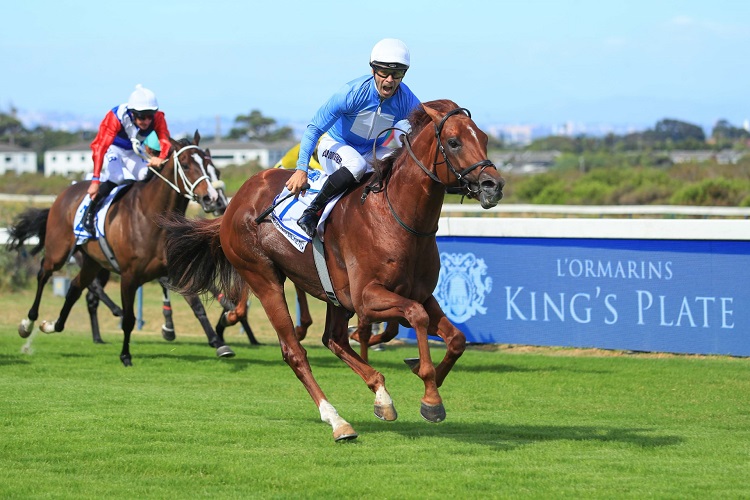
Mark Van Deventer's Speed Scores For The Equus Award Winners
Charles Dickens was the Equus Award winner who scored the highest speed figure (Picture: Wayne Marks)
Mark Van Deventer has shown all the Equus Award winners on his website next to their best speed figures, calculated by himself (see article below).
He said, “This provides important context and reveals what it takes to rate as excellent in SA horse racing.”
Equus Awards and Speed Figures (by Mark van Deventer)
The winners in various categories of the 2023/24 Equus Awards were announced in Cape Town (a couple of weeks ago). It’s a forum to take stock of what constitutes thoroughbred excellence in South Africa. The panel uses various criteria to distinguish between the nominees and preserve for posterity the achievements of the elite.
As regular readers of this newsletter well know, my preferred way of measuring performance is through speed and pace figures. Here are the corresponding speed scores (with sectional/pace upgrades included) of each winner. Notable figs obtained earlier in the season are listed first, followed by more recent numbers:
2-year-old filly Quid Pro Quo – 96 & 98.
2-year-old colt Proceed – 96 + & 95 +.
3-year-old filly Gimme a Nother – 112 & 110 & 106 ++.
3-year-old colt Green With Envy – 103 ++ & 113.
Sprinter Thunderstruck – 111 & 109.
Miler Charles Dickens – 120 & 117 & 121.
Mid Distance Royal Victory – 105 & 106.
Stayer Master Redoute – 107 & 108.
Older Female Princess Calla – 111 & 116.
Older Male Dave the King – 111 & 111 & 113.
Horse of the Year Dave the King – 111 & 111 & 113.
That’s what it takes to be at the apex of the pyramid in modern SA horseracing. As horses mature and reach their full powers their scores get higher. When they suffer an injury or fail to train on, that will be reflected in stagnant or declining numbers.
To win a Grade 1 as an older horse in the lower range as say, Royal Victory managed, requires a minimum score of around 106. SA’s true stars exceed 111, so when three-year-olds like Gimme a Nother and Green With Envy are hitting 112’s and 113’s already, they are poised to become shining gems. With expected, healthy development they might soon rate as rare, high- class champs once moving into the 116 + realm.
In terms of the ratings, Charles Dickens comes out top on my scale. A couple of his runs over a mile (s/s 120 and s/s 121) were up to true international level. He is quirky – both a difficult to train and awkward- to- ride character. But when everything fell ideally into place in his prep and on race-day, he delivered outstanding performances.
Loud applause for all the winners! And let’s roll on into the new season to appreciate the next batch of equine celebs!
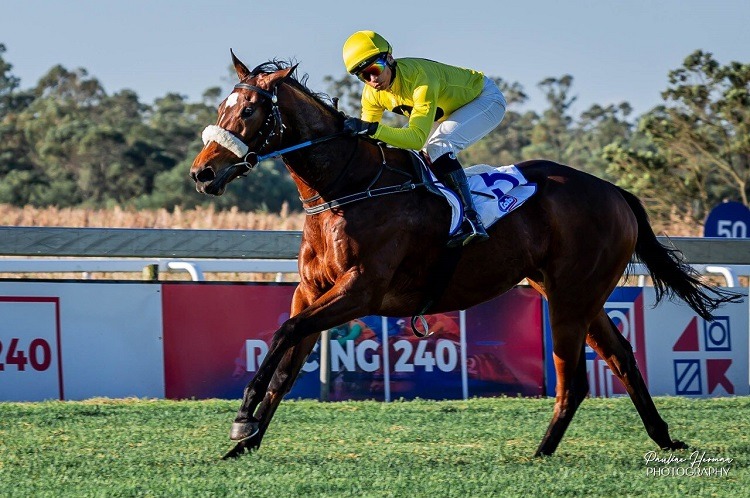
Joy And Peace Can Make It Five-in-a-row
Joy And Peace has been selected to win the Listed Jockey Club Stakes, which forms the third leg of the Eastern Cape Fillies And Mares Challenge (Picture: Pauline Herman)
Fairview Turf Formguides And Selections
Gold Circle
R1 (11) Stu’s Girl is holding solid enough Cape form to win this contest based on the opposition she does take on respectively. (3) Ponte Vecchio has been running consistently and will have a chance of winning however has had many tries. (1) String Of Lights is capable of winning if she brings her best form on race day however she can be unreliable. (14) Karoo Bokkie was short in the betting on debut and has scope to improve so isn’t without a chance in this sort of field respectfully. A case can be made for others as this isn’t an easy race to assess. ( Devonne Govender 11-3-1-14)
R2 Tough race. Keep an eye for market support on first timers. (10) Turbo Twenty has been placing in the Cape and warrants huge respect here. His last run was good and she is the firm first selection. (2) And Action ran well in the last start, he will be there in the mix and can win this contest. (3) Master Of Defense is always there and won’t be far once gain. (1) Flash Lightning wasn’t beaten far in the last start on his provincial debut and can build on that. ( Devonne Govender 10-2-3-1)
R3 (2) Mister Speaker ran behind a smart horse in the last start and could take some beating here. (7) Fredericos Passion has plenty scope to go well so must be respected, his last run was disappointing however he looks to have ability. (11) Blue Palace ran extremely well in the last start and has a light mass to carry so has to be factored in. ( Devonne Govender 2-7-11-1)
R4 (2) Gimme’s Laddie is holding top form and could take some beating here. (7) Forest Spy finished behind the top selection and won’t be far once again. (5) Piroshka is the unknown quantity here, he is very capable on his day and can blow them away if bringing his ‘A’ game. (3) The Mauritian is holding consistent form and drops back to 1200m now so respect his chances. ( Devonne Govender 2-7-5-3)
R5 (10) Komesans Passion has never been far in recent starts and is capable of winning here. (1) Free World wasn’t beaten far in the last start and can get a lot closer. (1) (3) Bytheliteofthemoon is capable of producing a big finish on his day so must be thrown in. (5) Magdala doesn’t have the best form on paper however is highly rated by her trainer, she ran against some smart horses in her last start and can get a lot closer at decent odds. (Devonne Govender 10-1-3-5)
R6 (7) Final Edition has run extremely well over the mile and rates a huge winning chance with Richard Fourie aboard. (8) Nothingelsematters is holding form over further but will be right there in the mix. (1) Timbavati River is very capable on his day so must be respected despite the top weight of 62kgs. (5) My Bestie is never far back and can get involved. ( Devonne Govender 7-8-1-5)
R7 (5) Joy And Peace is in excellent form and will take an absolute power of beating here. She has always been highly rated by her yard and just keeps getting better. (2) Gold Poker Game does represent some smart Cape form but will have to be at her absolute best to beat Joy And Peace. (7) Official Secret is very capable and can run into the placings. (1) Rockie Reef can pop up if bouncing back to earlier form. (Devonne Govender 5-2-7-1)
R8 (5) Guerra can produce a big finish on her day and if things go her way she will be flying late. (7) American Dream is never far back and can get a lot closer. (10) Meetatthewindsor won easily in the last start and can follow up here. (9) Dancingtothelight is never far back and will be in the mix here. ( Devonne Govender 5-7-10-9)
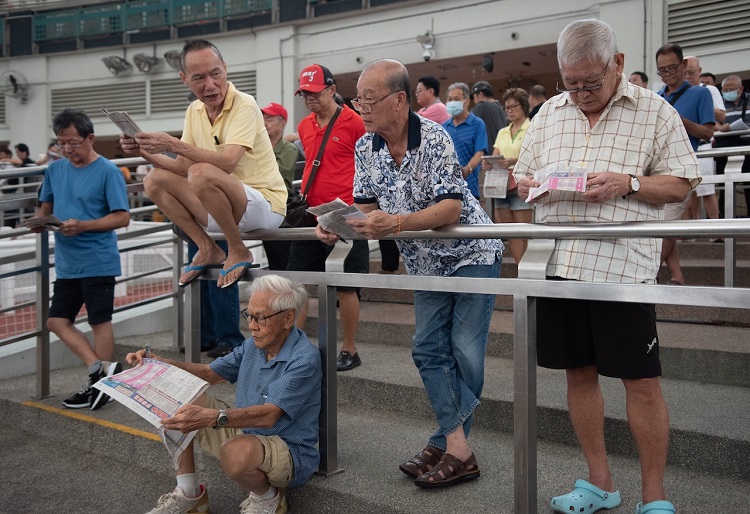
Kranji's Closure Will Be A Sad Day For The Elderly
The Singapore Turf Club’s pending closure will not only mean the loss of regular live entertainment for many of the city’s elderly, but it was also their social gathering point (Picture: Eunice Sng)
The Lonely Odds Awaiting Elderly Punters When Singapore Turf Club Closes
by Eunice Sng & Lok Bing Hong (ricemedia.co)
July 9, 2024
A chorus of cheers erupts from the grandstands of Singapore Turf Club every half an hour.
“Zao! (Run), Sa Ho! (Number Three)”, punters exclaim and call out their chosen horses’ numbers in Hokkien, raising their fists to the skies as thundering hooves charge toward the finish line.
Amidst the brief explosions of energy, one fact stands out: the gamblers are predominantly ageing Chinese men. Entering the Turf Club feels like stepping into another world, one ruled by the elderly. In the crowd, gap-toothed grins and crinkled eyes intently focus on the action.
As we wander through the venue, our feet crunch on discarded betting slips; our noses twitch against the constant plumes of cigarette smoke despite the prominent “No Smoking Indoors” signs. Empty blue Tiger beer cans litter the seats.
Betting on horse races is these elderly punters’ favourite pastime—a weekly reprieve from the drudgery of daily life. But soon, punters will lose this avenue for live entertainment when the Turf Club holds its last race on October 5th, 2024.
This will mark the end of almost two centuries of horse racing in Singapore, and with it, the community and microculture attached to the sport.
“It affects them on multiple levels. One is that they will no longer have that place to meet the people they usually meet regularly,” says Dr Andy Ho, a social scientist from Nanyang Technological University (NTU) specialising in psychosocial gerontology.
“It could also lead to them losing what usually gives their lives meaning, like that sense of connection and identity that they belong to this group of people. They hang out, drink coffee and talk about horses, which might give them a sense of purpose.”
Singapore is rapidly becoming a ‘super-aged’ society, with more than one in five people expected to be aged 65 and above by 2026, according to The Straits Times. This makes it all the more crucial to consider the recreational needs of a growing portion of the population—even if it does have inadvertent ramifications.
Tang Hoo Huat, 68, the owner of a convenience store at the nearby Kranji MRT, says: “Some of the punters got a heart attack and passed away while watching the races. It’s a very anxiety-inducing hobby.”
Speaking in Mandarin, Hoo Huat added that over the 17 years he has operated his shop, many of those who used to be his regular customers suddenly stopped visiting because they passed away or lost their ability to walk.
The ageing demographic partly explains why horseracing has become less popular—average spectatorship dropped 74 percent from 2010 to 2023. Only about 2,600 people now show up at the racecourse weekly. The sport failed to attract a new generation of followers who have many other entertainment options, and after the Covid-19 pandemic—which suspended racing for a time—race day attendance fell steeply.
Punters reminisced about the heydays in the 1980s when all three floors of the old grandstands at the club’s previous location in Bukit Timah would be packed with 60,000 people. The current racegoers at Kranji are the remnants of that era.
Overflowing car parks, women dressed in multicoloured dresses, and a visit from the late Queen Elizabeth II. As we flip through photographic archives of the Turf Club from the 1970s and 80s, we’re struck by how closely the race day atmosphere resembled sold-out arena concerts.
Now, glaring chunks of empty space pervade the stands in Kranji. The second storey remains closed because there is no need for additional seating. It’s almost as if each unclaimed seat represents a missing punter lost to old age over the years.
Rows of seniors still queue up diligently to pass their betting slips at the counters and pay with physical notes. Even though the Singapore Pools app allows them to place bets digitally, most punters prefer sticking to what they are used to.
We notice a familiar individual pacing the grounds every week: 68-year-old Ho Chye Hua. As we make eye contact, he grins and calls out in Mandarin, speech slurring from his dentures, “Young ones! You’re here again.”
Chye Hua has been a patron for the last 40 years. He recalls how, in earlier days, the atmosphere at Bukit Timah was like a “warzone”, with people snatching money, quarrelling, and getting into tussles with policemen. Police officers would then round up the offenders in buses headed for the police station.
“People would bring bags of cash to bet. Some always drop on the floor, and you can just pick it up,” he chuckles.
The Kranji racecourse is muted in comparison. The ‘wildest’ incident we witnessed was a lone punter suddenly yelling out a stream of expletives in Hokkien while stomping his feet after losing a bet. Others simply glanced at him amusedly before turning their attention back to their betting booklets once he ran out of breath.
While shutting down a place with a notorious reputation may seem better for society, the Turf Club plays an important role in the lives of the elderly individuals who frequent it beyond the act of gambling.
Horse betting offers these seniors in their 60s to 90s— usually from the working class—a way to pass the time during their retirement. It’s an alternative to staying home and milling about the neighbourhood coffee shops.
“I don’t have many other activities to do and don’t know where else to walk, so I come here,” says punter Ng Kwang Hock, 74, in Mandarin. “I drink a can of beer and stay for a few hours, then go back home.”
“Last time, when the Turf Club held more races in a week, walking around inside was a good way to kill time,” Zhang Ah Liang, 66, chimes in.
Another punter, 72-year-old Ng Choon Kee, shares that it “has become a habit” since he has been doing it for the past five decades. He started betting when the Bukit Timah Racecourse was still around. He says he will be “very sad” once the Turf Club closes and that he’ll “miss the feeling of winning”.
Gambling at the Turf Club gives them something to “stimulate them mentally” and direct their energy towards since most of them are no longer working and their children have all grown up, according to a 2018 sociology thesis titled Racing From Alienation: Horse Betting As A Safety Valve Amongst Elderly Chinese Punters at the Singapore Turf Club by National University of Singapore (NUS) graduate Choy Yun Zhen.
Most of them do not have other fulfilling hobbies outside of horse betting.
“There’s only a few things to do. Very simple: watch TV, gamble, and sleep,” says Ah Liang.
The paper goes on to describe how these elderly punters feel isolated from mainstream society. They hold an underclass status because they no longer actively contribute to the economy and command less authority in the household.
Such is the case for Ah Liang. Although he lives with his children, he feels lonely and bored at home because “old people and young people don’t mix well”. Since their children have entered adulthood and built their own lives, they no longer have to rely on him.
Yun Zhen’s thesis explained how the elderly punters used to be breadwinners and spent the majority of their time outside working. Now that they stay home, their “extended presence [in the domestic sphere] is unwelcome by their family,” pushing them to the racecourse.
Over here, forking out part of their savings on betting is a form of leisure, relieving them from the frustration of their daily lives.
“What’s the point of leaving all my money in my bank after I die? It’s no use to earn so much and then keep it. Might as well use some here,” says Leong Chee Kwan, 62.
The punters, resigned to their mortality, know they are merely playing the waiting game. The Turf Club offers a familiar haven as they idle away the days to their end.
Before a race, punters crowd in front of a parade ring where they watch horses being led around the loop. The seniors scrutinise their race guides and Chinese newspapers for information on the steeds before placing a bet. Some whip out a pair of binoculars to get a closer look at the horses’ body language.
“This is already my fourth or fifth pair of binoculars. The rest broke, so I had to buy a new one,” one uncle says.
“In the past at Bukit Timah, the horses didn’t come up that close, so if you didn’t have the binos, you couldn’t see anything.”
Horse betting is a complex game that needs a level of expertise. The guides contain details on the horses’ racing history. From this, punters analyse and decide which horse they want to pin their hopes on.
Since the hobby requires inside information, it gives these old devotees a temporary sense of control that compensates for the powerlessness that they feel in their day-to-day existence, according to Yun Zhen.
The author further elaborates that they can “assume an alternative identity that” does not exist beyond the Turf Club’s gates, such as being a horse racing expert. This makes them feel empowered because it is a more “prestigious” position than being stuck at home and seen as a nuisance to family members.
The punters feel proud that they have been dedicated to horse betting for multiple decades. Hence, their advanced age and accumulated experience bestow an illusion of authority over their lives.
But, of course, the hobby is merely a distraction. Yun Zhen’s thesis emphasises that any power they perceive to hold at the Turf Club vanishes once they walk out. Their horse betting knowledge does not benefit them outside these gates.
Other than power, the Turf Club offers a loose sense of community. Often frowned upon by society as a vice, gambling here allows them to be equals among peers, indulging in their hobby without fear of judgment from their families.
After years of betting, seasoned punters spot familiar faces at the racecourse every weekend and usually approach one another to make small talk.
“Here, I have a group of horse betting friends. We can gather and discuss horse betting topics. So even though I can just watch the races on my phone, I choose to come here,” says Chee Kwan while sitting at the parade ring.
Chee Kwan adds that he does not actively seek these friends out but greets and talks to them for short periods when he bumps into them. The connections are fluid. Though brief, these casual networks they form also help to relieve the isolation they feel.
The same goes for a punter who only wished to be known as Guan, in his 60s. Familiar faces would nod their heads at him and make hand signals on which horses they are betting on, and he claps their shoulders and shares kopi with them.
Sam Lee, 65, makes that coffee. He runs a drinks store in the Turf Club, offering hot, cold, and alcoholic beverages to the punters who spend the day there.
Sam laments the closing of the club and confesses that he worries about the regular punters who come to seek social interaction and occupy their time.
“You need to treat this place like a place of heritage. It’s not just about gambling. There are 181 years of history and memories here,” he remarks.
“If this place closes, there’ll be two scenarios for many old people in Singapore. One, spend their time at coffee shops—but how long can you go on like that? Another one is to just wait until their time is up.”
Before the races begin, punters purchase betting booklets from a stand near the Turf Club’s entrance.
Another punter who feels the loss keenly is David Choong, 78. Armed with binoculars and a tidy organisation of newspapers around him, he introduces his two friends.
“But most of my friends don’t come anymore, and some are…” he trails off. His eyes glisten with tears before he collects himself.
“Why wouldn’t I be sad? These are all old friends. Why wouldn’t I think of them? I meet some below my block, but I’ve lost contact with so many,” he says.
David adds that although he knew the Turf Club’s closure was inevitable, he still feels it is a waste for Singapore to remove one of the older generation’s main sources of entertainment.
“Not being able to see familiar faces anymore, it makes me feel…” he sighs. “We’ll still talk over the phone, but it’ll definitely feel different.”
The bedrock of friendships among elderly punters would be lost, robbing them of their sole leisure activity.
Such a loss could significantly impact their mental well-being. NTU social scientist Dr Ho explains that older adults from lower socioeconomic backgrounds are at higher risk of depression. So, the Turf Club punters are especially vulnerable. And although longevity among Singaporeans is increasing, people are not ageing healthier.
“Mental health among the elderly is quite poor. Research has shown that if you’re lonely, the impact on someone’s holistic wellbeing can equate to having 15 or 16 cigarettes a day,” adds Dr Ho.
This is not the first time the horse racing community has experienced loss. When the Turf Club moved to Kranji in 1999, many staff who worked at the former Bukit Timah site and their families had to relocate from the Labourers’ Quarters, the only home that they ever knew.
Tamilsegar s/o Rama, 56, now a driver for snack items, was one of them. Tamilsegar lived there for 30 years when his father was head supervisor of the racing track and he was a track rider.
He talks about how the Indian workers would gather to pray to deities at a small temple in the quarters set up by the Turf Club management and listen to music in a multi-purpose room. The Indian community also organised traditional events, inviting the other Malay and Chinese workers to join the celebrations.
Tamilsegar was so attached to the place that he chose not to vacate the premises and stayed on to the final day, even when everyone else left. Friends and family members had to convince him to leave when the authorities closed off the Bukit Timah area at the turn of the century.
Until mid-2023, Tamilsegar would go through the broken fences and record tours of the abandoned dormitory buildings, talking about his memories there. He also shares photos from that time on a private Facebook group called TCIB, short for ‘Turf Club Indian Brothers’.
It has been more than two decades, but his face still comes alive when we ask him more about his days at Bukit Timah. Tamilsegar gets emotional.
“Going back there brings tears to my eyes. How would you feel if your home was taken away from you?”
With the horse betting hub on its last lap, what can be done to help these older persons find meaning in their golden years and safeguard their mental health?
Dr Ho, who studies creative ageing, mentioned alternative art forms that seniors can explore.
“A lot of older folks in my research talk about culinary arts, horticultural therapy, and storytelling,” he said. These are what seniors in the community value,” he offers.
“They want to be able to share their experiences with future generations because they have lived a long life. Being able to retell these stories helps them to have a stronger sense of personhood, and that can lead to great mental health outcomes.”
He also emphasised the importance of physical exercise and talked about how different types of exercise can be promoted at senior activity centres to cater to their varying tastes.
But elderly punters are creatures of habit, so introducing these activities to them might be an uphill task. To bridge this gap, Dr Ho suggested that the government consider deploying social workers and volunteers at the club to set up roadshows.
“During these few final months, the volunteer welfare organisations (VWOs) can station some booths there with brochures to engage the seniors,” he says.
“These VWOs can expose them to other kinds of hobbies and even identify groups of seniors who’ve been together gambling for a long time, inviting the whole group to try something new.”
Dr Ho stressed: “This is a great way to engage them in a timely manner right now. Because once this place closes and they all go back to where they live, then it’s really hard to catch them.”
Singapore has raced down the highway of progress in recent decades, but such rapid advancement often means leaving behind aspects that have long been integral to older generations.
At the Turf Club, we spot people on mobility scooters. Others grip walking canes. Some totter back home by themselves at days’ end. We see weather-worn faces sitting alone, looking wistfully across at the track and screens. Melancholy is rife.
As we leave, we see one gentleman above the parade ring who has not moved from his seat since we saw him at the start of the day. He holds neither betting slips nor newspapers, unlike the others. When we catch his cataract-clouded eyes, he gives us a ghost of a smile, disappearing behind the top of the escalator.
This is the generation clinging to the last vestiges of familiarity and bygone glories. We cannot help but feel they know they are on borrowed time—and all they want to do is spend it doing things they have always done.
Like the horses galloping past, we cannot help but feel we have left them behind.

Britney Wong Leans on Zac Purton Ahead Of Hong Kong Debut
Picture: Trainer David Hall. new jockey Britney Wong and Amy Chan pose for photos at Sha Tin. Picture: Jack Dawling. The first meeting of the new season will be on Sunday 8 September at Sha Tin. (South China Morning Post)
by Jack Dawling (South China Morning Post)
Britney Wong Po-ni hopes some advice from Hong Kong’s seven-time champion jockey will hold her in good stead.
Wong will be the first female jockey to ride full-time in Hong Kong since 2017 and the 25-year-old says she is raring to go after seeking guidance from Australian ace Zac Purton in the build up to the new season.
“I actually don’t think words can explain my excitement because this is a very huge opportunity for me,” said Wong, who fronted the media at Sha Tin on Thursday.
“I’ve been working very hard to get [a licence], so I’m very pleased that the club has given me the opportunity.
“I’ve had lots of help from people at the jockey school and Zac also came over to share his thoughts with me on Tuesday. His preparation is very thorough and he covers everything. I think that’s a big thing to learn from.”
Wong, who first joined the Jockey Club’s trainee programme in 2016, returns to her home country after riding 50 winners from 602 races in Australia and most recently gaining further education from a short stint in New Zealand.
She was forced to fly back to Hong Kong in April after an application for an extension of her stay was declined by the Australian government due to a change in visas for overseas students.
While Wong hopes her international experience can enable her to hit the ground running at Sha Tin, she is under no illusion of the tough challenges ahead.
HK Racing News
Get updates direct to your inbox
Enter your email
Sign up
By registering you agree to our T&Cs & Privacy Policy
Britney Wong joins the Hong Kong roster.
Britney Wong joins the Hong Kong roster.
Related articles
“Riding in Hong Kong is a really big step up for me,” Wong said. “I’m not going to have any silly expectations, but every win is a win and every ride is a ride. So I’ll just do my best to give my horses every possible chance in each race.”
Wong will be indentured to trainer David Hall, who admits the youngster may face a baptism of fire early in the season.
“If you look at the previous apprentices that have come to Hong Kong, they’re probably a little bit more advanced than what she is,” Hall said.
“I hope the expectation is not too daunting for her because it will be very tough.
“I’m happy to have her on board and of course, a 10-pound apprentice can always be a handy one for the stable. Hopefully, it will be a good journey for her.”

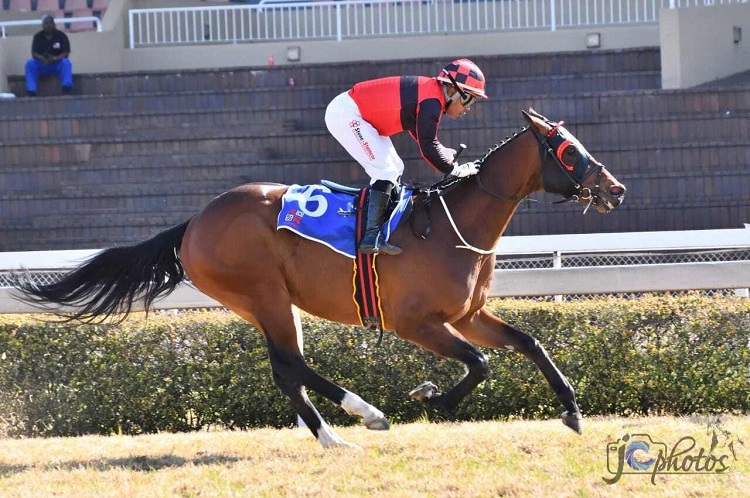
Yeni Double Takes Him To Joint Top Spot
The progressive Mike and Adam Azzie-trained Ideal World gelding Deception Pass won easily first time out the maidens and gave Muzi Yeni a double on the day (JC Photos)
Muzi Yeni joined Sean Veale at the top of the national jockeys log after a double at the Vaal straight course today.
Philasande Mxoli also rode a double.
Yeni is on 21 wins achieved at a strike rate of 15.111%.
Veale’s 21 wins have come at 20.79%.
Mxoli has 9 wins at 13.04% and is in fifth place on the national log.
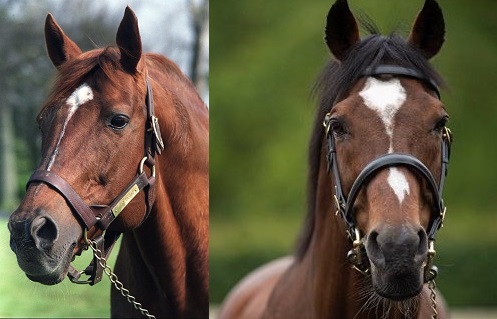
Today's Question
The picture gives a clue to the answer
Why is March 30 an iconic day in the annals of thoughbred horseracing?
Midweek FIELDS



